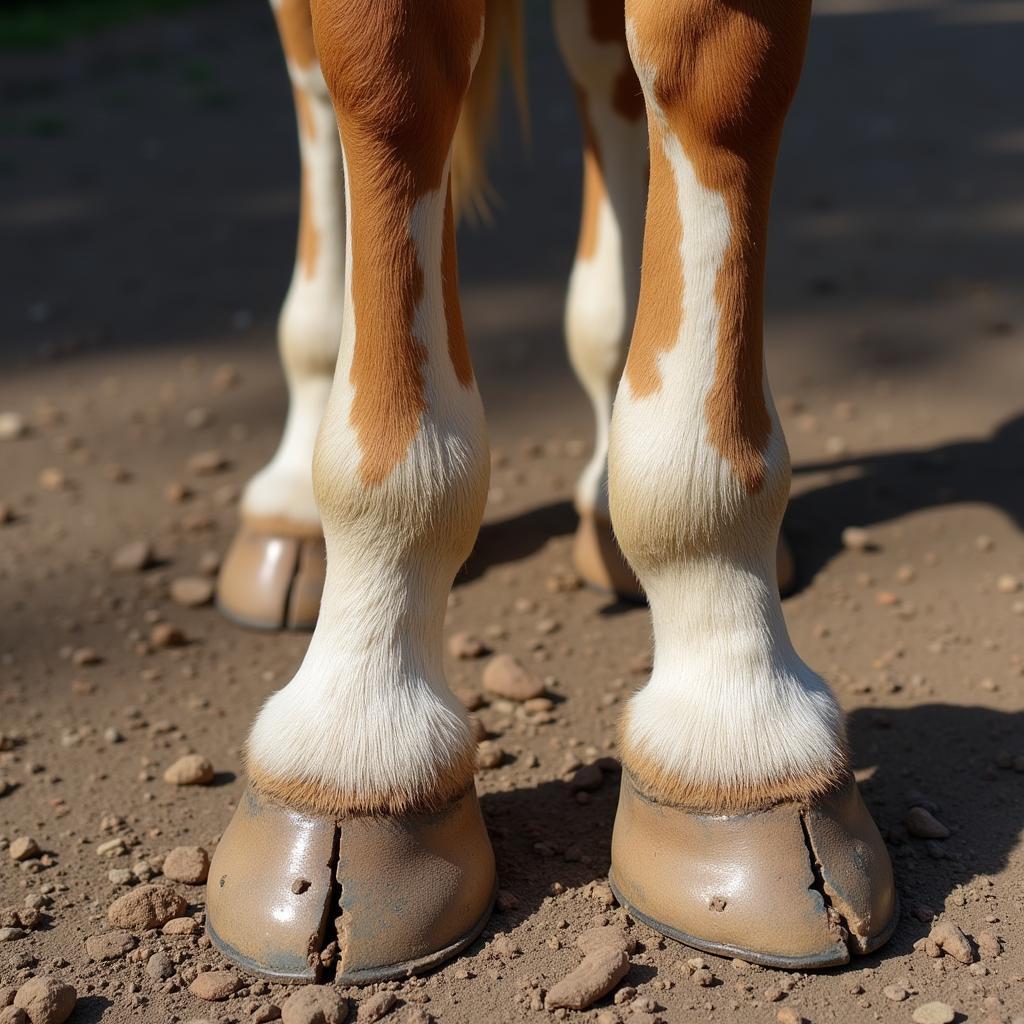Sulfur For Horses is a common supplement used to support hoof health, skin condition, and overall well-being. This essential mineral plays a vital role in various bodily functions, making it a valuable addition to many equine diets.
Understanding the Importance of Sulfur for Horses
Sulfur is a key component of several amino acids, including methionine and cysteine, which are crucial for building proteins like keratin. Keratin is the primary structural protein in hooves, hair, and skin, contributing significantly to their strength and resilience. A deficiency in sulfur can lead to weak, brittle hooves, dull coats, and various skin issues. Providing adequate sulfur through supplementation can help maintain healthy hoof growth, promote a shiny coat, and improve overall skin condition.
Besides its role in keratin synthesis, sulfur also plays a part in other essential bodily functions. It aids in the formation of connective tissues, cartilage, and insulin, and contributes to various metabolic processes. Additionally, sulfur is essential for the production of certain vitamins and enzymes, highlighting its importance for overall equine health. Supplementing with sulfur can be particularly beneficial for horses with hoof problems, skin conditions, or those recovering from injuries.
Different Forms of Sulfur for Horses and How to Administer Them
Sulfur supplements for horses are available in various forms, including powdered supplements, granules, and topical preparations. Powdered supplements can be easily mixed with the horse’s feed, ensuring convenient and consistent administration. Granular sulfur can also be added to feed, offering a palatable option for picky eaters. Topical sulfur preparations are commonly used for skin conditions, allowing for targeted application to affected areas. When choosing a sulfur supplement, it’s crucial to select a high-quality product specifically formulated for horses. Always consult with a veterinarian to determine the appropriate dosage and form of sulfur for your horse’s individual needs. They can assess your horse’s overall health, diet, and any existing conditions to recommend the most effective supplementation strategy. For example, horses with specific hoof problems might benefit from a combination of sulfur supplements and hoof supplements for horses.
Signs of Sulfur Deficiency in Horses
Recognizing the signs of sulfur deficiency in horses is crucial for early intervention and prevention of potential health issues. One of the most common signs is poor hoof quality, characterized by cracks, brittle hooves, and slow growth. Additionally, a dull, lifeless coat and skin problems, such as dryness, itching, and rain rot, can also indicate a sulfur deficiency. In some cases, horses may also experience joint pain and stiffness.  Horse exhibiting signs of sulfur deficiency, including poor hoof quality and a dull coat If you suspect your horse is deficient in sulfur, it’s important to consult with a veterinarian for proper diagnosis and treatment recommendations. They might recommend combining sulfur supplementation with other supplements, such as mane and tail growth supplements for horses to address specific concerns.
Horse exhibiting signs of sulfur deficiency, including poor hoof quality and a dull coat If you suspect your horse is deficient in sulfur, it’s important to consult with a veterinarian for proper diagnosis and treatment recommendations. They might recommend combining sulfur supplementation with other supplements, such as mane and tail growth supplements for horses to address specific concerns.
What are the benefits of sulfur for horses?
Sulfur provides numerous benefits for horses, including improved hoof health, a shinier coat, and better skin condition. It also supports the formation of connective tissues and aids in various metabolic processes.
How much sulfur should I give my horse?
The appropriate dosage of sulfur for horses varies depending on their individual needs and the specific supplement used. Always consult with a veterinarian to determine the correct dosage for your horse.
Can sulfur be used to treat skin conditions in horses?
Yes, topical sulfur preparations are often used to treat certain skin conditions in horses. However, it’s important to consult with a veterinarian before using any topical medications on your horse. For severe cases, you might consider using a lime sulphur dip for horses under the guidance of a veterinarian.
Are there any side effects of sulfur supplementation in horses?
While generally safe, excessive sulfur intake can lead to digestive upset in horses. It’s crucial to follow the recommended dosage and consult with a veterinarian if you notice any adverse effects. They can also advise on combining sulfur with other beneficial supplements like liquid joint supplements for horses or seraquin for horses for a comprehensive approach to equine health.
Conclusion
Sulfur for horses plays a crucial role in maintaining their overall health, particularly in supporting hoof health, coat condition, and skin health. By understanding the importance of sulfur and its various benefits, horse owners can make informed decisions about supplementing their horse’s diet. Remember to consult with a veterinarian to determine the appropriate dosage and form of sulfur for your horse.
FAQ:
- What are the signs of sulfur deficiency in horses?
- What are the different forms of sulfur supplements available for horses?
- How can I administer sulfur supplements to my horse?
- What are the benefits of using sulfur for horses?
- Are there any risks associated with sulfur supplementation in horses?
- How much sulfur should I give my horse daily?
- Can sulfur be combined with other supplements for horses?
For further assistance, please contact us at Phone: 0772127271, Email: [email protected], or visit our address: QGM2+WX2, Vị Trung, Vị Thuỷ, Hậu Giang, Việt Nam. We have a 24/7 customer service team.